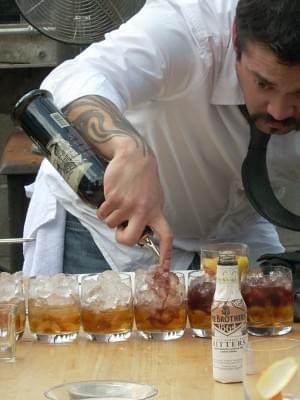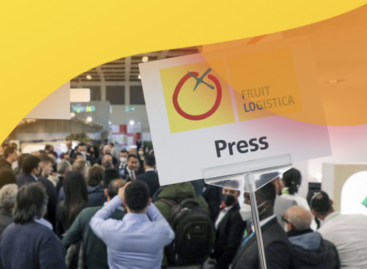Magazine: Our cocktail!
Despite Hungary’s relatively poor cocktail culture our bartenders achieve good results in different competitions and at the annual Drinks International Boutiq’Bar (Budapest) was named one of the world’s 50 best bars. Another recent success is that Ákos Orosz won a silver medal in the long drink category at the World Cocktail Championship in Beijing – in part his success is also the result of the Boutiq’Bar team that helped him prepare.
Many Hungarian bartenders work abroad, partly because they learn the profession with the goal of making a career abroad and because they can learn more there than in Hungary – we are informed by Péter Morafcsik, vice-president of the Hungarian Bartender Association (MBU) and head of the Bols Bartending Academy. Fact is that Hungarians are still just learning about the world of cocktails and it is a disadvantage that the profession is not adequately represented at culinary events. According to Gábor Szabó, Horeca manager with Monin syrup distributor Panna Cocktail Kft. the generation change in the guests of bars and clubs requires changes behind the bar too. Young bartenders in Hungary bring significant attitude shift in the profession as they are aware of the latest world trends and are really open to novelties. Mr Szabó told our magazine that the majority of Hungarian bars and clubs offer 15-20 types of cocktail and from these only the most widely known 5-8 (Mojito, Cosmopolitan, Pina Colada, Cuba Libre, etc.) are selling. It is the bartending profession that has the key to progress: László Purman, the head of Brown-Forman’s Hungarian representation would start popularising cocktail drinking at the basics, he thinks that representatives of the beverage industry and bartenders should meet regularly and discuss new products and trends. Mr Morafcsik and Mr Purman agree that the best way of learning is going abroad. An extra source of knowledge and motivation could be participating in competitions. Unfortunately, less and less competitions are organised but MBU’s bartending courses regularly involve thematic in-house competitions. The MBU’s vice-president is convinced that if we could learn to enjoy wine and beer we will learn to appreciate cocktails as well. Recession slows down the process but we are going in the right direction. Cocktail trends are influenced by culinary and health macro trends. Currently the use of spices, herbs and bitters is gaining ground and molecular mixology is also up and coming, although the latter still has to fight a few battles for acceptance. Vodkas and white rums are still popular and gin is the emerging new star. Sweet flavours are being replaced with dry, sour and bitter ones. Lemonades (without alcohol) and Aperol spritz are really in fashion but demand for beer base cocktails is still low. The first wine and cocktail bars have already opened in Budapest – this could be a sign of change.
Related news
Related news
This year, Trade magazine is asking its readers for their opinions on Christmas TV commercials! Vote for yourself!
The audience voting takes place between December 12 and 19,…
Read more >FRUIT LOGISTICA 2025: The exhibition awaits visitors with numerous innovations
Representatives of the international fruit and vegetable trade will meet…
Read more >EuroCIS 2025: Serious interest in the retail technology trade fair
Amazon and TikTok recently signed an agreement that will allow…
Read more >







